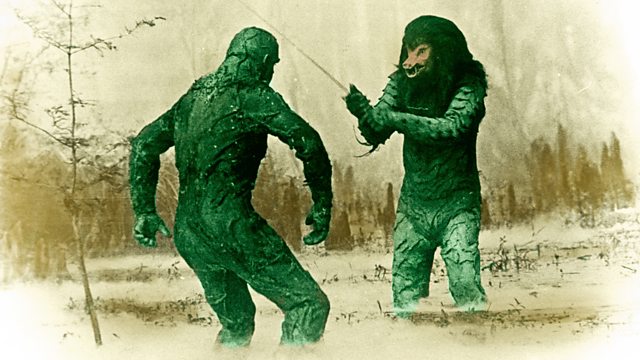
Almost Like Literature
Robert Hanks discusses what George Orwell called 'good bad books' - novels that set out to entertain, but which one way or another do something rather more impressive.
A talk by Robert Hanks on what George Orwell called "good bad books" - novels (loosely interpreted) that set out to entertain, but which one way or another do something rather more impressive. Some books that might be mentioned:
1. The Daffodil Affair by Michael Innes (1942). On the surface, The Daffodil Affair an extravagant and elaborate detective story-cum-thriller, set against the background of the Blitz and featuring, alongside Innes's regular protagonist, the intellectual Inspector Appleby, a mathematical horse, a witch-girl, a paedophilia-obsessed policeman and a tribe of Amazonian headhunters. But Innes was also J. I. M. Stewart, author of the final volume of the Oxford History of English Literature and a leading authority on modernism; and under this novel's fantastical surface is a portrait of a civilisation suffering a collective nervous breakdown, retreating from war and the threat of apocalypse into superstition - a portrait that drew inspiration from T. S. Eliot and in its turn inspired Graham Greene.
2. Gamesmanship, Oneupmanship and Lifemanship by Stephen Potter (1947-52). Most people wouldn't regard Potter's trilogy (I do not speak of Supermanship - the Godfather Part III of his oeuvre) as a novel at all; they take the form of a set of comic manuals on achieving sporting and social success. But the books do almost everything you demand of a sophisticated novel: there are vividly drawn characters (Gatling-Fenn, Godfrey Plaste of "Plaste's Placid Salutation", the obnoxious Odoreida); there is plot - there are far too many plots, in fact - and incident; and there is a thoroughly modern and promiscuous mingling of the real and the fictional. Above all, there is an over-arching satirical vision - Potter is a moralist, who detects and despises in our a society a willingness to believe that being good is only a matter of persuading other people you are good.
3. The Shield Ring by Rosemary Sutcliff (1956). It's a truism that historical novels say more about the time they're written than the time they supposedly portray: and Rosemary Sutcliff's novels together form one of the most vivid meditations on what it meant to be British in the years after the Second World War. Dawn Wind and The Silver Branch, set in the dying years of the Roman Empire, are about the agonies of imperial retreat, seen from the point of view of a colonial power; The Shield Ring, about a colony of Vikings in the Lake District holding out against the Norman yoke, sees colonialism from another angle: in the era of the Malaysian emergency, the Mau-Mau rebellion and the first stages of the Vietnam War, it is a sympathetic portrayal of asymmetric warfare. But it is also, in an age when "You've never had it so good", a lament for a people exhausted by conflict, resigning themselves to a new world that promises to prove infinitely drearier and more wearing than the old.
4. Saturn's Children by Charles Stross (2008). On the one hand, it's a fast-paced space-opera about a sex-robot zipping about a solar system denuded of human life - and what's a girl to do without the man for whom she's been hardwired to go weak at the titanium knees? On the other hand, it's an examination of free will and the difficulty of human existence in a universe where god is dead; it's a warning of the emptiness and hostility of the galaxy beyond our doorstep; and it's a beehive of allusions, from The Perils of Pauline to Isaac Asimov via P. G. Wodehouse and Raymond Chandler.
5. Swamp Thing, issues 21-64, by Alan Moore (1983-87). To begin with, the Swamp Thing was a scientist, Alec Holland, transformed by radiation into a dripping green monster, part man, part vegetable, haunting the swamps of Louisiana: then along came Alan Moore, a Northampton-born writer, best known for writing science-fiction strips in the British comic 2000AD, to reinvent the Swamp Thing as a spirit - often a vengeful one - of the earth. Over the next four years, he transformed a moderately popular American horror comic into a wildly inventive, ironic, mystical contemplation of nature, sexuality and the necessity of evil; and with a cast of fully-realised characters and a rhythmic, descriptive prose style, he transformed the understanding of what comics could do.
Last on
Broadcast
- Fri 19 Feb 2010 20:00大象传媒 Radio 3
